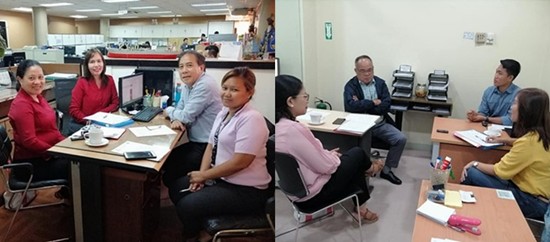
NMP
maritime research personnel conducting data gathering
activities. |
NMP addresses
industry needs through relevant researches
By
National Maritime
Polytechnic
October 29, 2019
TACLOBAN CITY –
Pursuing its second mandate as a research institution of the
government on maritime matters, the National Maritime Polytechnic (NMP)
undertakes researches and studies that generate data and information
integral in a dynamic maritime industry.
With its radar focused on
maritime manpower development consistent with the workforce
framework of its mother agency, the Department of Labor and
Employment (DOLE), the NMP embarks on research initiatives and
advocacy that relate to the Philippines as the world’s largest
provider of competent seafarers.
This year, NMP is
undertaking four (4) researches as provided under the 2019 General
Appropriations Act (GAA) and targeted to be completed by 31 December
2019, to wit:
Effects of Autonomous Shipping in the Philippine Maritime Industry
The study aims to identify
and discuss how manning and shipping companies respond to this new
development in shipping, the autonomous ship technology, and what
interventions they will take to address the challenge to produce
qualified seafarers for vessels of the future.
More specifically, the
study aims to: (a) determine the possible effects of autonomous ship
technology to the Philippines as a major crew provider to oceangoing
vessels; (b) identify career options or alternative profession where
displaced seafarers could possibly apply when full autonomous
shipping is implemented; (c) document required competencies and
skills and the interventions or measures being done by manning and
shipping companies, as employer of the seafarers, in the light of
the impending full implementation of autonomous ship technology; and
(d) recommend strategies and approaches to address identified skills
gaps / training needs in response to the full implementation of
autonomous ship.
The Capacity of the Philippine Maritime Industry to Produce
Officers-In-Charge (OIC) per Requirements of the 1978 STCW as
Amended: Focus on cadet Onboard Training
The research undertaking
aims to determine the capacity of the Philippine maritime industry
to produce Officers-In-Charge in accordance with the requirements of
the 1978 STCW, as amended, with focus on the Onboard Training
Program as a mandatory requirement to obtain a degree in Bachelor of
Science in Marine Transportation (BSMT) and Bachelor of Science in
Marine Engineering (BSMarE) and a Certificate of Competency (COC)
for officers.
The specific objectives of
the study are: (a) to determine the outputs of individual Maritime
Higher Education Institutions (MHEIs) in terms of graduates versus
enrollees in BSMT and BSMarE, including the deployment rate of
cadets under the Onboard Training Program; (b) determine the number
of Philippine domestic ships, Philippine-flagged ships engaged in
international voyage available for training berths and Philippine
manning agencies that accommodate cadets on behalf of their
international shipowners, as well as their policies on accommodating
cadets; (c) identify issues and concerns in the implementation of
the Onboard Training Program from the viewpoints of the
stakeholders; and (d) recommend a plan of action to identified
issues and concerns.
Employment Acceptability of Women in Philippine Domestic Shipping
The study intends to
identify and analyze the gaps in the recruitment and selection
process of domestic shipping companies when it comes to female
seafarer employment. Primarily, the study aims to: (a) determine the
level of domestic shipping companies in employing women; (b) gather
information on the current policies and practices in the recruitment
and selection process of domestic shipping companies with regards to
the employment of seafarers; (c) identify the challenges faced by
women when applying for shipboard employment in domestic vessels;
and (d) recommend a plan of action for the improvement of female
recruitment into domestic shipboard jobs.
Profile of Philippine Maritime Employment Laws
The study is designed to
provide the Filipino seafarers with a supplemental tool in the
understanding of the employment laws, related cases or
jurisprudence, and the arbitration process related to their
employment.
The research is grounded
on the following objectives: (a) identify the Philippine employment
laws and decided cases in relation to the employment of Filipino
seafarers; (b) present the arbitration process in the Philippines
regarding seafarers’ labor cases; (c) identify the cases lodged in
the Philippine arbitration routes; and (d) provide guidelines on
actions to be taken by seafarers confronted with issues related to
seafaring.
NMP, being the only
government maritime research center in the country, responds to
dynamic characteristics of the maritime industry and the consequent
demand for timely, accurate, and relevant data as basis for program
and policy development.
Findings of these
researches will be disseminated next year to the industry
stakeholders from the government, maritime education and training
(MET) institutions, maritime associations, seafarers’ organizations,
shipping companies and manning agencies. Recommendations from the
researches may serve as valuable inputs to policy making and program
development that impact on the Filipino seafarers as a special
workforce of the country.
Those interested in NMP
research undertakings may visit the NMP website (www.nmp.gov.ph) and
access the e-Research Information System Portal which is designed to
disseminate NMP completed researches, present the Research Agenda
and engage the industry stakeholders to collaborate in the research
activities.
Aside from its research
function, the NMP continues to upgrade its facilities and provide
maritime trainings required pursuant to the Standards of Training,
Certification, and Watch keeping for Seafarers (STCW) Convention as
amended in 2010 including value-adding courses towards improving the
qualifications of Filipino seafarers for their employment
acceptability and enhanced competitiveness.